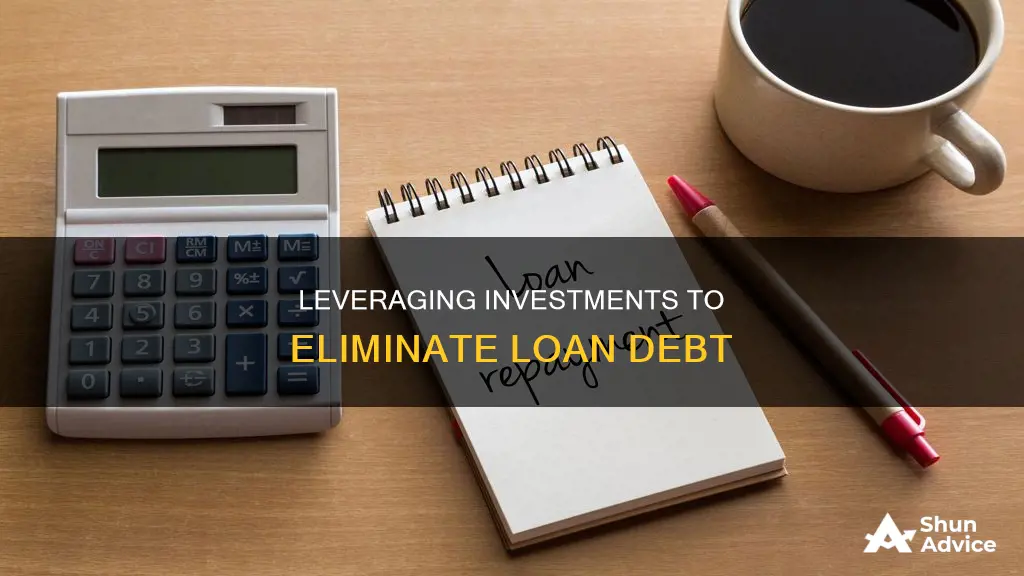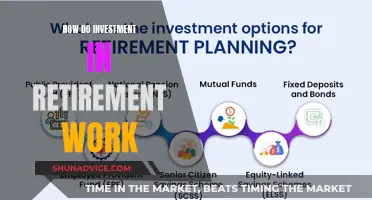
Paying off a loan using investments can be a great way to achieve your financial goals. However, it is important to consider various factors, such as the type of loan, interest rates, investment opportunities, and personal financial goals.
For example, if you have high-interest credit card debt, it often makes more sense to focus on eliminating it as quickly as possible rather than investing. This is because the interest rates on credit cards are typically higher than the returns on average investments. On the other hand, if you have a low-interest loan, such as a mortgage, investing your money may be a better option, as you could potentially earn a higher return on your investments than the interest cost of the loan.
Additionally, it is crucial to assess your risk tolerance when making decisions about paying off loans or investing. Investing in the market comes with the risk of losses, and you need to be comfortable with the potential for volatility.
Ultimately, the decision to pay off a loan or invest depends on your individual circumstances and financial goals. Consulting a financial planner or advisor can help you evaluate your options and make an informed decision.
| Characteristics | Values |
|---|---|
| Interest rates on debt | Should be lower than the rate of return on investments |
| Ability to stay on top of debt payments | Should be manageable |
| Retirement timeline | Should be considered when deciding how quickly to pay off debt |
| Total debt burden | Should be manageable |
| Credit score | Paying off loans can improve your credit score |
| Risk tolerance | Should be assessed when deciding whether to pay off debt or invest |
What You'll Learn

Paying off high-interest debt first
When deciding which debts to pay off first, it's important to consider the type of debt, the interest rate, the outstanding balance, and the impact on your credit score. If you're dealing with a lot of debt, it can be challenging to know where to start. Here are some reasons why paying off high-interest debt first may be a good strategy:
Save Money on Interest
Prioritising debt with the highest interest rates can help you minimise the amount of interest you pay overall. Credit card debt often has high interest rates, and by focusing on paying off this type of debt first, you can reduce the amount of interest that accrues over time. The longer you take to pay off high-interest debt, the more expensive it becomes due to compounding interest.
Gain Quick Wins and Stay Motivated
Paying off debt can be a long and challenging journey. By tackling debts with the highest interest rates first, you may find yourself making slower progress, especially if those debts also have large balances. This can be demotivating and may cause you to lose steam. On the other hand, focusing on smaller debts first, regardless of the interest rate, can give you quick wins and help you stay motivated. This is known as the "debt snowball method."
Improve Your Credit Score
Your credit score is crucial when it comes to borrowing money in the future. Lenders will look at your credit score when deciding whether to offer you a loan and what interest rate to charge. One factor that contributes to your credit score is your credit utilisation ratio, which is the amount of credit you're using relative to your credit limit. By paying off high-interest debt, especially credit card debt, you can lower your credit utilisation ratio and improve your credit score.
Avoid Legal Issues and Protect Your Assets
Some types of debt, such as tax debt, can lead to legal issues if left unpaid. Additionally, delinquent accounts and debts in collections can negatively impact your credit score and make it difficult to borrow money, rent an apartment, or open utility accounts. Prioritising these types of debt can help you avoid legal consequences and protect your assets.
Free Up Cash Flow
High-interest debt can eat away at your cash flow and hinder your ability to achieve other financial goals. By paying off this debt first, you can reduce the amount of money going towards interest and free up cash flow for other purposes, such as investing or saving for retirement.
When deciding whether to pay off high-interest debt first, it's important to consider your financial situation, objectives, and long-term goals. Creating a plan and sticking to it is crucial to successfully paying off your debts. Additionally, if you have the means, investing in a side hustle can help you increase your income and accelerate your debt repayment journey.
Altcoin Investment: Best Picks
You may want to see also

Advantages of paying off loans before investing
While investing is an important part of building wealth for the future, there are several advantages to paying off loans before investing. Here are some key benefits to consider:
Reducing Interest Payments
By paying off your loans first, you can reduce the overall interest you will pay on the debt. The longer you take to repay a loan, the more interest accumulates, increasing the total cost of the loan. Clearing your debt as soon as possible minimizes these interest charges.
Improved Credit Score
Paying off loans can positively impact your credit score, which is crucial if you plan to take out other loans in the future, such as a mortgage or car loan. Lenders consider your credit score when deciding whether to approve a loan and what interest rate to offer. A higher credit score may result in more favourable loan terms.
Peace of Mind
Being debt-free can provide a sense of relief and reduce financial stress. Knowing that you don't owe money to anyone can be liberating and allow you to focus on other financial goals. Additionally, if you experience a financial emergency, not having any debt means you won't have to worry about missing loan payments and potentially facing penalties or negative consequences.
Increased Monthly Savings
Once your loans are paid off, the money that was previously dedicated to loan payments becomes available for other purposes. This extra cash can be used to increase your savings, build an emergency fund, or even invest in the future.
Building Equity
When you pay down debt, especially a mortgage, you build equity in an asset. This equity can be leveraged in various ways, such as through a home equity loan or line of credit, which can provide access to additional funds when needed.
Better Position for Future Investments
Clearing your debt can put you in a stronger position to invest in the future. Without the burden of loan payments, you can allocate more funds towards investments and potentially take advantage of more investment opportunities.
Investments: Strategies for Persuasion
You may want to see also

Investing in stocks, bonds, or mutual funds
Stocks
Investing in stocks can be a risky move, as there is no guarantee that the stock will perform well. However, it offers the potential for higher returns compared to other investments. When you buy a stock, you're purchasing partial ownership of a company, and your returns will depend on how well the company performs. If the company does well, the value of your shares will increase, but if it doesn't, you may lose some or all of your investment. Stocks are generally riskier than bonds but can provide higher returns.
Bonds
Bonds are a type of investment that helps governments and corporations raise money. They are considered a safer investment option than stocks, but they are not completely risk-free. When you invest in a bond, you're essentially loaning money to the issuer (government or corporation) at a fixed interest rate. The issuer will pay you back the face value of the bond, plus interest, once it matures. Bonds are rated by credit rating agencies to help investors assess the level of risk involved.
Mutual Funds
Mutual funds pool money from multiple investors and use it to invest in a variety of securities, such as stocks, bonds, or short-term securities. They offer instant diversification, as your money is spread across a wide range of investments, reducing the overall risk. Mutual funds are managed by professional fund managers who make investment decisions on behalf of the investors. This can be a convenient option for those who don't want to research and manage their own investments. Mutual funds may have fees associated with them, which can vary depending on whether they are actively or passively managed.
Key Considerations
When deciding whether to invest in stocks, bonds, or mutual funds to pay off a loan, consider the level of risk you're comfortable with, the potential returns, and the diversification of your portfolio. Additionally, keep in mind the interest rate on your loan, as it's generally a good idea to prioritize paying off high-interest debt before investing.
Investing and Paying Off Debt: Strategies for Financial Freedom
You may want to see also

When to pay off a mortgage
When deciding whether to pay off a mortgage or invest, it's important to consider your financial situation, risk tolerance, and individual goals. Here are some key factors to help you determine when to pay off your mortgage:
- Interest rates and market conditions: Compare your mortgage interest rate with expected investment returns. If you have a low mortgage rate and expect higher investment returns, investing may be more advantageous. Conversely, if your mortgage rate is high, prioritising repayment can save you money.
- Risk tolerance: Investing in the market carries higher risk but offers the potential for higher rewards. Paying off your mortgage is generally considered safer, providing a guaranteed return on investment through interest savings.
- Financial goals: Assess your financial priorities, such as emergency savings, retirement planning, and other debts. Ensure you have adequate savings and are on track with your retirement goals before allocating extra funds towards your mortgage.
- Tax implications: Consider the tax benefits of both options. Paying off your mortgage early may result in losing tax deductions on mortgage interest. Additionally, evaluate the tax advantages of investing, such as tax-advantaged retirement accounts or the potential for employer matching contributions.
- Peace of mind: Being debt-free can provide a sense of financial security and reduce stress. If the idea of debt weighs on you, paying off your mortgage early may improve your overall well-being.
- Opportunity cost: Understand the trade-offs. Money put towards your mortgage is not available for other financial goals. Consider if investing that money elsewhere could provide a higher rate of return.
- Liquidity: Investments typically offer better liquidity than paying off your mortgage early. Stocks, bonds, and similar investments can be sold relatively easily if you need cash. In contrast, accessing the equity in your home can be more challenging and may involve selling your house or taking out a loan.
- Retirement planning: The earlier you start saving for retirement, the more time your investments have to grow. Consider your age and how much time you have until retirement. If you're younger, investing for retirement may be a more attractive option.
- Prepayment penalties: Be aware of potential prepayment penalties for paying off your mortgage too quickly. Some lenders may charge a penalty based on the outstanding principal balance if you pay off the mortgage within the first few years.
- Compounding interest: Understand the power of compounding interest, both for investments and debts. Paying off your mortgage early reduces the interest you pay over time, while investing early allows your investments to grow faster.
Invest: Picking the Right Neighborhood
You may want to see also

How to do both: invest and pay off debt
Establish an emergency fund
It is recommended to have an emergency fund to cover your expenses for at least six months. This will help you avoid racking up more debt in case of unexpected expenses.
Consider debt relief options
You can establish a debt management plan to help lower your debt. A debt management counsellor can negotiate with creditors on your behalf to lower your monthly payments and reduce interest charges. The money saved can then be put towards investing for retirement.
Find a side hustle
Increasing your household income can help you eliminate debt and generate cash to invest. With the gig economy, it has never been easier to find a side hustle.
Prioritise paying off high-interest debt
Paying off high-interest credit card debt first is often recommended by financial experts. Credit card interest rates are typically much higher than the average returns on investments, so you will likely save more money by paying off this debt first.
Don't forget about retirement
While paying off debt is important, don't forget about saving for retirement. Investing early and taking advantage of compound interest can help you build wealth over time. If your employer offers matching contributions to a retirement plan, be sure to contribute enough to qualify for the full match.
Sphere 3D: A Risky Investment Move
You may want to see also
Frequently asked questions
It depends on the interest rates of your loan and the potential returns on your investments. If your loan has a high-interest rate, it's often better to pay it off first. However, if you can earn a higher return on your investments than the interest rate on your loan, investing may be a better option.
Paying off loans with high or variable interest rates can reduce your monthly expenses and improve your credit score. It also removes the unpredictability of paying more interest if you have a variable interest rate loan.
Yes, paying off loans may limit your opportunity to make money on those funds. For example, if you have a low-interest mortgage, it may make more financial sense to invest your money instead of paying off the loan early.
Yes, it is possible to do both. Many people create financial plans that allow them to pay off loans while also making small investments, such as taking advantage of an employer 401(k) match.
Consider the type of loan, interest rates, investment opportunities, and your personal financial goals and risk tolerance. Consult a financial planner or advisor to help you evaluate your options and create a long-term financial plan.







